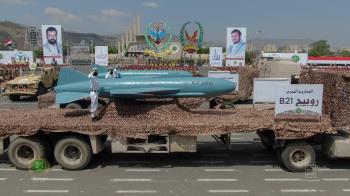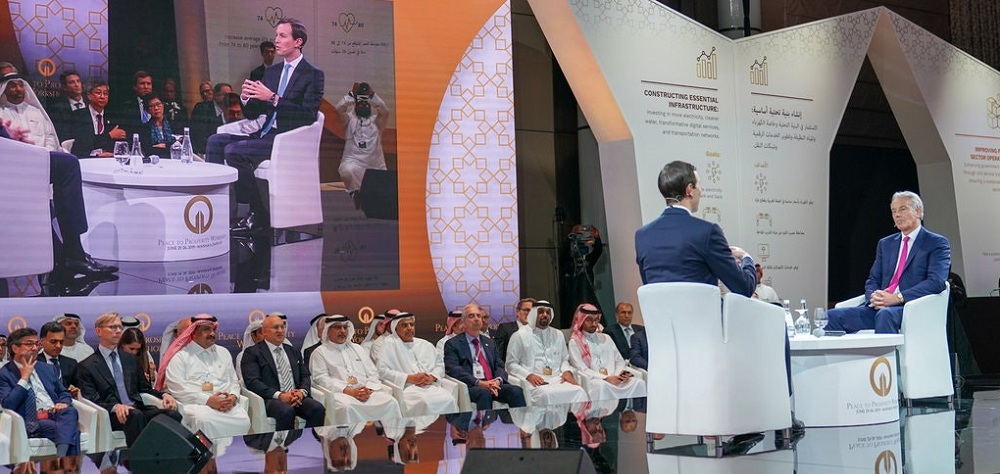Alwaght- After months of waiting for Washington to unveil what it calls “the deal of the century” regarding Palestine, last week the global attention went to an “economic workshop” linked to Trump’s initiative held in Bahrain. But as it was expected, the sensitivity across the Muslim world to the Palestinian cause and the Israeli occupation and atrocities drew strong backlash against Bahraini rulers as Bahrain’s hosting of an event was meant to prepare the ground for implementation of the deal of the century. The anger with Al Khalifa’s “treasonous” move was so severe in Iraq for example that furious protestors stormed the Bahraini embassy in Baghdad and planted Palestine’s flag atop its building.
Normally, the foreign policy of the countries is determined by the way of definition of the national interests. As Hans Morgenthau, a theorist of international politics of the twentieth century, puts it the national interests are that group of interests on which the states in a specific period of time and with regard to the political, economic, and cultural conditions design their foreign policy in their relations with other countries. Now the question is that what goal has driven Bahrain leaders to host such a heavily-disparaged meeting?
Three reasons motivate countries to host international conferences. First, the countries seek to get some weight and influence in an important international case. This serves an aim to channel the course of developments regarding the case in accordance with their foreign policy objectives. For example, the US over the past decades played as a mediator in the Israeli-Palestinian dispute as part of its West Asia foreign policy.
Second, the countries are motivated to host the international conferences by a hope to gain international prestige. International prestige is the respect and credibility a country builds for itself on the international stage and among global actors. The countries go through a set of ways to be regarded as respectable states on the world arena.
And the third factor is an attempt to win the public opinion’s positive view at home and abroad. After all, at the present time, the public is the most important factor affecting the decision making process of the states, as the governments can no more rely on traditional inter-government exchanges for their relations. This factor abroad serves to easily pursue a state’s foreign policy and internally serves to build legitimacy and acceptance among the public.
Returning to Bahrain’s hosting of a Trump initiative-related investment workshop, we can conclude that Manama has failed to gain any of the above-mentioned goals by hosting the meeting. Palestinian groups and many Arab nations unanimously and strongly rejected the preparations for the deal of the century. Not only Manama made no gains to influence the Palestinian cause but also presently the Palestinian people put Bahrain’s Al Khalifa in the ranks of their enemies and a betrayer of their seven-decade cause.
When it comes to the intention to promote their prestige, the Bahraini rulers failed to make any difference mainly because the US President Donald Trump’s deal does not have the least international support and the powerful players and the UN reject it. They not only challenge the claim that it brings peace to the already-volatile region but also they argue it will fuel the tensions and insecurity and even can pose risks to world peace. So, Bahrain’s siding with the project does not bring it any credit.
Furthermore, the Muslim world and even Bahrain’s public are firmly against compromising plans like the deal of the century that effectively damage the Palestinians’ rights and pave the way for Arab diplomatic normalization with the Israeli regime. Hosting an anti-Palestinian workshop by Bahrain while Manama regime intensified the crackdown on any free comment on the event by own people only further blackened the regime’s image in the eyes of regional and own people.
So, the conclusion is that the Bahraini regime, which like many other authoritarian rules prioritizes repression to save its own power not people’s contentment, only eyes foreign support— like that of Saudi Arabia that is the main reason why so far the Bahraini uprising failed to catch its goals—behind its hosting Palestine investment gathering.
Now, the regime of Bahrain is the key stooge of the Americans and Israelis in pressing for a diplomatic thaw between the Arab states and Tel Aviv. The effort will certainly erode the pillars of the rule of Al Khalifa over time and paint the ruling family in the eyes of the regional and home people as mercenaries who are tasked with implementing the foreign agenda instead of genuinely following the national interests. At the end of the road, the popular power in the region which stems from the regional developments will challenge regimes majorly taking their strength from dependence on foreign powers.



























